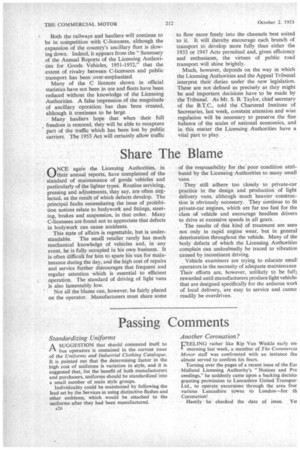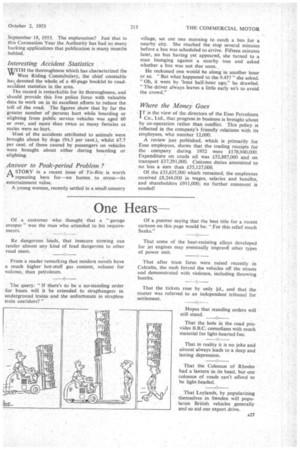Passing Comments
Page 28

Page 29

If you've noticed an error in this article please click here to report it so we can fix it.
Standardizing Uniforms
ASUGGESTION that should commend itself to bus operators is contained in the current issue of the Uniforms and Industrial Clothing Catalogue. It is pointed out that the determining factor in the high cost of uniforms is variation in style, and it is suggested that, for the benefit of both manufacturers and purchasers, uniforms should be standardized into a small number of main style groups.
Individuality could be maintained by following the lead set by the Services in using distinctive flashes and other emblems, which would be attached to the uniforms after they had been manufactured.
A26
Another Coronation?
FEELING rather like Rip Van Winkle early on' morning last week, a member of The Commercia Motor staff was confronted with an instance tha almost served to confirm his fears.
Turning over the pages of a recent issue of the Eat Midland Licensing Authority's "Notices and Pre ceedings," he suddenly came upon a backing decisiol granting permission to Lancashire United Transpon Ltd., to operate excursions through the area fror various Lancashire towns to London—for th Coronation!
Hastily he checked the date of issue. Ye!
September 18, 1953. The explanation? Just that in this Coronation Year the Authority has had so. many backing applications that publication is many months behind.
Interesting Accident Statistics
WITH the thoroughness which has characterized the " West Riding Constabulary, the chief constable has devoted the whole of a 40-page booklet to roadaccident statistics in the area.
The record is remarkable for its thoroughness, and should provide this live police force with valuable data to work on in its excellent efforts to reduce the toll of .the road. The figures show that by far the greater number of persons hurt while boarding or alighting from public service vehicles was aged • 60 or over, and more than twice as many females as males were so. hurt.
Most of the accidents attributed to animals were brought about by dogs (94.3' per cent.), whilst 67.7 per cent. of those caused by passengers on vehicles were brought about either during boarding or alighting.
Answer to Peak-period Problem ?
.A STORY in a recent issue of Tit-Bits is worth ' repeating here for—we hasten to stress—its entertainment value.
A young woman, recently settled in a small country village, set out one morning to catch a bus for a nearby city. She reached the stop several minutes before a bus was scheduled to arrive, Fifteen minutes later, no bus having yet appeared, she turned to a man lounging against a nearby tree and asked whether a bus was not due soon._ He reckoned one would be along in another hour or so. "But what happened to the 9.45?" she asked. "Oh, it went by 'bout half-hour ago," he drawled. "The driver always leaves a little early so's to avoid the crowd."
Where the Money Goes
• i-r is the view of the directors of the Esso Petroleum Co., Ltd., that progress in business is brought about by co-operation rather than conflict. This policy is reflected in the company's friendly relations with its employees, who number 12,000.
A review just published, which is primarily for Esso employees, shows that the trading receipts for the company during 1952 were £178,940,000. Expenditure on crude oil was £52,887,000 and on transport £37,291,000. Customs duties amounted to no less a sum than £55,127,000.
Of the £33,635,000 which remained, the employees received £8,244,000 in wages, salaries and benefits, and shareholders £911,000; no further comment is needed!




























































































